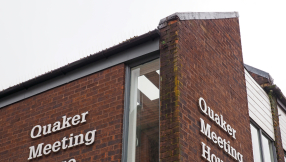German churches' experience with the issue of "domestic violence" will play an important role in a Peace Declaration of the World Council of Churches planned for 2011, said Georges Lemopoulos, deputy general secretary of the World Council of Churches (WCC).
"The churches have denied the existence of this issue for a long time," he said in Frankfurt on Saturday.
Frankfurt was the first stop for a WCC team of six people led by Archbishop Bernard Ntahoturi from Burundi. The visit of the WCC team in Germany is one of several team visits planned throughout the world between now and 2010 to prepare for the International Ecumenical Peace Convocation in 2011.
The convocation is the culmination of the WCC's Decade to Overcome Violence 2001-2010, in which the German churches have been particularly active and committed from the outset. In Frankfurt, projects and experiences from south-western Germany were presented to the international team.
Rev Helene Eichrodt-Kessel, from the Evangelical Lutheran Church in Württemberg's office for the Decade to Overcome Violence, told the WCC team that the Protestant churches are pushing to have the issue of domestic violence included as part of the school syllabus in Baden-Württemberg and also to increase access to advice for victims.
Domestic violence is an issue taken up both in theological training and in-service training.
"In our jobs, we go into people's homes and have the opportunity to speak with them," she said.
Congregations receive calls for help from women and children. One in four women has been a victim of violence at least once.
The Rosenstrasse 76 exhibition by the German development agency Bread for the World helps local congregations talk about the issue and is used both nationally and internationally - this year by the Evangelical Church of Westphalia.
Janette Baechtold-Ludwig, director of the National Council of Christian Churches of Brazil (CONIC), praised the way the exhibition had been conceived and the accompanying events that rural and urban parishes organised around it.
"Domestic violence takes place behind closed doors. When we learn about it, it's already too late," said Archbishop Ntahoturi. In his home country Burundi it was seen as one of the results of war. Through its "focus on the family" project, his church had also found out about cases of sexual abuse, he added.
Answering a question from the delegation about the extent to which culture and religion influence domestic violence, the Rev Eli Wolf, director of the Protestant women's centre in Frankfurt, said that at the moment most of the women seeking protection had a migration background, although domestic violence affected all parts of society. She also talked about working with Muslim women who are working on changing male role models in their environment.
Through its international ecumenical network, the Association of Churches and Missions in South Western Germany, (EMS), has been gathering people to read biblical peace texts together with partners abroad.
"Everything had to be translated and that demanded a bit of patience", said the Rev Dorothea Frank, about the exchange with a student group from Cameroon. "We learnt that we have the Bible as our common treasure and that no one has the right to insist on just one way of interpreting it."
The organisers of the meeting in Frankfurt have great hopes for the ecumenical declaration on just peace that will be issued by the peace convocation in 2011, said the Rev Ulrike Schmidt-Hesse, deputy director of the EMS. She hoped that clear positions on current challenges would be taken up alongside more general reflections.
The day in Frankfurt was prepared by the Evangelical Church in Hessen and Nassau, the Evangelical Church in Baden, the Evangelical Lutheran Church in Württemberg, the Württemberg ecumenical network and the EMS.
Most Popular
Stay up to date with Christian TodayNews

Nigeria: 11 killed in night attack by militants
11 people were killed in yet another massacre in Nigeria

Quakers respond to police raid with worship meeting outside Scotland Yard
Quaker activists will protest against a raid on their Meeting House by the police

Can ordinary Christians learn from the Amish?
From questioning the use of technology to taking the Bible very seriously, we can learn more than quilt-making and horse-and-buggy riding from these quirky American communities.

NI conversion therapy proposal will criminalise innocent behaviour
A proposal to ban conversion therapy in Northern Ireland has been labelled "jellyfish legislation".





